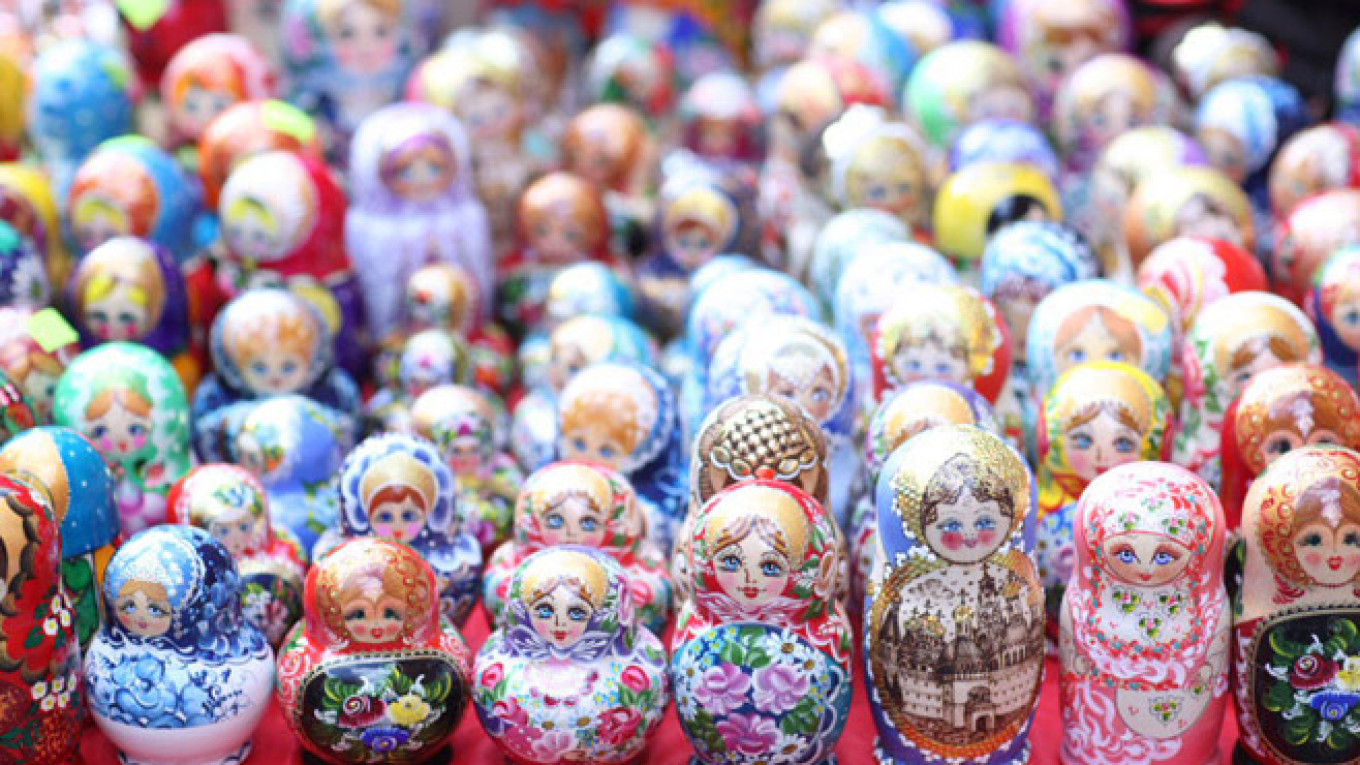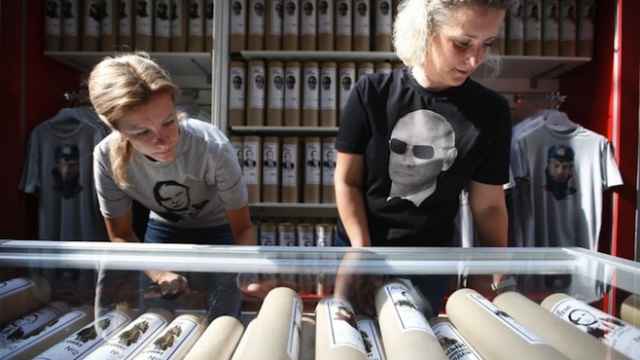Russia's relations with the West may have reached lows unparalleled since the Cold War, but the trend for kitschy Russian and Soviet souvenirs abroad appears to be as popular as ever, bringing vendors a pretty penny.
Selling souvenirs on online marketplaces such as eBay and Etsy can yield a profit of 300 to 500 percent, vendors told The Moscow Times.
Vendors buy the items at second-hand stores and antiques markets around the former Eastern Bloc, and sell them mostly to Americans enchanted with the keepsakes of the once-mysterious Soviet culture.
But it's a line of business that is not without its complications. There is a relatively high customs duty to send items abroad from Russia, and strict regulations on exporting objects of national heritage.
Every vendor who spoke with The Moscow Times said they operate outside Russia.
"It's too expensive to go to Russia, and it requires a visa, but I think the best items may be there," said Merilin Pold, who runs an Etsy shop called "Merilin's Retro" from her home in Tallinn, Estonia.
Bargain Hunting
Pold said she finds most of her items locally. "Mostly I get my items from our local thrift stores and Internet auctions, but also from my friends and summer markets."
She said she often drives around her native Estonia to find items.
One other vendor who did not wish to be identified to avoid problems during future visits to Russia said he comes here periodically to find especially rare and high-quality items.
The markup can be high, the vendors said, but prices should be similar to those of the competition — and the competition can be tough. A search for Soviet items on the Etsy and eBay online marketplaces reveals dozens of sellers.
Bora Erdinc, who was born in Turkey but is now based in Berlin, said he currently makes about 300 euros a month by selling a dozen or so items on his Etsy shop SovietGallery.
He got into the business a few months ago after buying some clocks in Sofia, Bulgaria, and putting them online for sale, he said. "I had 10 different ones, and Americans bought them all," he said.
He emphasized the importance of having quality products, with professional-looking photos to show them off on the website.
"Some really beautiful stuff that I bought really cheap can for sure have a high profit," he said.
Pold, who has sold more than 700 items since starting her online business in 2013, said she prices her products "rather high because these kinds of items are quite limited and are no longer available anywhere."
She added that some prices are negotiable. "Higher prices also leave me some room for discounts," she said.
American Audience
Erdinc said his top buyers of Soviet antiques are Americans, followed by other Westerners. "Germany and Austria are mostly interested in kitchen stuff: glasses, plates," he added.
Pold, who sells a lot of Soviet-era antiques, said that 90 percent go to customers in the United States, followed by Australia, the United Kingdom, Japan and France.
She said that many of her customers grew up in the Soviet Union and are nostalgic.
"I've seen such joy when people discovered something familiar from their childhood. So many former Soviet people are living abroad now."
Alex Bugayev, who runs an Etsy store simply called "SovietWatches" and is based in Odessa, Ukraine, said 80 percent of his customers are in the United States.
He got into the business in summer 2012 after collecting watches for years as a hobby.
"I learned that in the West they highly regarded Soviet watches," he said. "I began to sell them some watches so I could buy more."
The Real Deal?
One of the main obstacles faced by would-be vendors is authenticity. Some of the souvenirs offered at eastern Moscow's popular Izmailovsky Park market, for example, are made in China.
Magnets, keychains and even some traditional matryoshka nesting dolls are made cheaply in China and brought to Russia to sell to tourists, a Moscow Times report revealed in 2011.
Igor Konnov, an antiques seller at the market, confirmed recently that some modern souvenirs are made in China, but he was adamant that his goods are authentic.
He has been a collector for years and said a close look at an item can discern its quality. He said he sells his antiques, which include Soviet-made toys, tea-glass holders and other knickknacks, to mostly locals who are nostalgic for the bygone era.
Confusing and restrictive postal rules are another hurdle faced by anyone seeking to export local goods.
The regulations de facto prohibit the export of items made prior to the 1930s and can cause problems for shipments of antiques even if they were made after that.
One seller said that the Culture Ministry could grant approval for specific items to be taken out of the country, but that the process to get permission can be long and arduous.
In addition, there is a customs duty — about 1,000 rubles ($15) for a package weighing between one and two kilograms — to send items abroad.
A Way of Life
Despite the obstacles, making a living from the international treasure trove of Soviet souvenirs also has its advantages.
"This is my current day job. I buy the items, wash them, take pictures," said Pold. "I can plan my own time and do the job when I want to. I can take a vacation whenever I want."
And for some, it's as much of a passion as a job.
"You have to love old things and not to be afraid of thrift shops and filthy things," said Pold. "You must have a good eye to purchase the right things so your shop looks beautiful.
"It's a lot of work, but if you love old things it's great."
Contact the author at p.spinella@imedia.ru
A Message from The Moscow Times:
Dear readers,
We are facing unprecedented challenges. Russia's Prosecutor General's Office has designated The Moscow Times as an "undesirable" organization, criminalizing our work and putting our staff at risk of prosecution. This follows our earlier unjust labeling as a "foreign agent."
These actions are direct attempts to silence independent journalism in Russia. The authorities claim our work "discredits the decisions of the Russian leadership." We see things differently: we strive to provide accurate, unbiased reporting on Russia.
We, the journalists of The Moscow Times, refuse to be silenced. But to continue our work, we need your help.
Your support, no matter how small, makes a world of difference. If you can, please support us monthly starting from just $2. It's quick to set up, and every contribution makes a significant impact.
By supporting The Moscow Times, you're defending open, independent journalism in the face of repression. Thank you for standing with us.
Remind me later.






